- Home
- Alan Campbell
Scar Night Page 7
Scar Night Read online
Page 7
“We found him,” Mark said.
She paused for a moment, then continued loading her armour.
“Sypes expects us both present at the Sending.”
“I’ve stuff to do.”
“You don’t have a choice.”
A bitter smile stretched her lips.
Mark opened the window and leaned out, peering up at the foundation chains and the underbelly of the Gatebridge. “This has to be the lowest room in the temple. Is that some kind of symbolic statement? Keeping you lot down here in the foundations like this, in the darkness?”
“Access.”
“What?”
“Never mind.”
Mark looked round her room, but apparently spotted nothing of interest. “They don’t give you much, do they?”
Rachel slipped a blowpipe into her belt, then hefted her crossbow from the dresser and began to oil the bowstring. “I have everything I need,” she said.
“You any good with that thing?”
“I’m still alive.”
Mark sighed. He searched the room again, before his gaze returned to the crossbow in his sister’s lap. “I heard about the new soul-thief. The aeronauts are looking this way. Apparently most of the husks have been temple staff.”
She ignored him.
“Have you seen anything?”
“Like what? Someone carrying a bloodless corpse?”
Mark Hael was silent for a while, then said, “If you’re hiding something…”
She snorted. “You know me better than that.”
He threw up his hands. “No, Rachel, I don’t know you. I’ve hardly seen you in a dozen years. They’ve moved you from one backwater hole to the next. If you aren’t rotting down here in this monk-infested dungeon they like to call a school, then you’re traipsing through stinking, Heshette-fouled caves under some unholy mountain.” By now he’d found the wine on the dresser. She heard the stopper slide from the carafe, heard him sniff. “Low Coyle Valley,” he said. “Hardly worth the effort of pouring it.”
“Then don’t.”
Mark replaced the stopper. “Listen, I’m sorry. It’s been a difficult week for me.”
Rachel’s teeth clenched. She set down her crossbow and went over to the window, her back to him. She leaned out and let the breeze caress her face. The foundation chains were silhouetted against the morning sky. She knew these chains well; they provided routes into every part of Deepgate—hidden routes. But she knew the city rooftops better. For four years now, she’d hunted them on Scar Night. Four years, totalling about fifty Scar Nights, and in that time she’d loosed nine bolts. The thing she hunted knew the rooftops better than anyone.
A rook hopped across the ledge below, black as the iron around it. She watched it watching her. Was her quarry watching her too? Unlikely, she supposed, for Carnival shunned the daylight.
Mark said, “Decent of Sypes to let Father go through. I don’t think there was a drop of blood left in him. Crumb saw the truth of that. Dry as leather, he said. Felt like slapping the fat little princess for talking about our father that way.”
The benefits of being a Hael. Mark’s rank in the aeronauts, her own acceptance for Spine testing, all won for them by the family name—a name dragged inch by inch from the League to Ivygarths by generations of iron smugglers, plantation slavers, and temple bootlickers.
“You don’t even care,” Mark said. “After everything he’s done for you?”
“Get out,” she snapped.
“There was a time I would have slapped you for speaking to me like that.”
Rachel remembered, but she didn’t turn round. Twelve years with the Spine was armour enough against Mark. It was armour enough against everyone. She sighed. Almost everyone.
Mark’s voice dropped to a whisper. “I have the consent documents, the authorization for your tempering. The Spine masters are pressing me to sign.”
Rachel stiffened.
“I don’t know,” Mark said. “I’ve been thinking…Rachel, I don’t want you like them.”
She closed her eyes.
“They’re soulless.” He waited. “Nothing more than walking corpses. I can’t imagine you like that, my own sister. I don’t want to—”
Rachel could no longer restrain herself. “You liar!” she cried, wheeling to face him. “You’re doing it to hurt me. You’re bitter because you failed their tests and I passed. You blame me for Father’s disappointment in you—”
“You’re still an Adept.”
“Do you know what I had to do to earn that rank? Do you know how hard it was?”
Mark gave her a cold smile. “I heard about your little display.”
“Display?”She’d beaten every Adept, one after another, in single combat, and that hadn’t been enough. So, bruised and exhausted, she’d then challenged her master. An insult—had he been even capable of perceiving insults. In the end he’d been capable of nothing but focusing to keep his lungs clear of blood.
“Well…” Mark was looking around for something to distract him, but failed. “All the more reason that you don’t need to come under the Spine needles. If you can fight like that, untempered—”
“I had no choice! They don’t trust me, won’t accept me. I had to give them grounds to wait for your consent. If you don’t sign those papers, they’ll get rid of me, kick me out—or worse.” She paused, looked hard at her brother, and a sudden realization came to her. “That’s what you want, isn’t it? You want them to boot me out. You want me to fail.”
“I want to protect you,” he muttered.
“You callous bastard.”
“Callous?” Mark’s face reddened. “That’s marvellous, coming from you. How many Shetties did you clear from Hollowhill?”
Trust Mark to use a word like clear . His killing was done from an airship, from a distance. Whole tribes of Heshette were cleared by poison deployment. Men, women, and children were cleared by judicious, precise, carefully managed, cost-effective use of incendiaries. Mark was never close enough to hear them cry or beg. He never saw them bleed or foul themselves. They were simply cleared —never killed, never murdered . Her hand tightened on one of the bamboo tubes at her belt, then she relaxed it. She took a deep breath. “Please,” she said quietly, “sign the papers. Let them temper me. I can’t live like this any more. I can’t do the things they want me to do.”
“No, Rachel.”
“Then get out. I want to be alone.”
“You’re always alone . Do you hate company so much?”
Did she? The monks didn’t exactly forbid relationships. It was never that simple. They just kept her down here, training, focusing, or had her moving from one dark part of the world to the next. She remembered the very first time she’d held a sword, how she’d laughed, spinning with it like a dancer while her father looked on, grinning. That had been one of the last times she’d laughed. But she’d danced with it again: in Hollowhill and the Shale Forest, in Heshette caves and gin dens and Sandport brothels, until the sword had become as much a part of her as faith was to the tempered. She’d danced a hundred times before they’d assigned her to the rooftops, to Carnival. You aren’t ready, they’d warned. But it won’t make any difference .
She squinted up at the painfully blue sky beyond the foundation chains. Her eyes were not accustomed to the daylight, for to hunt at night, she’d had to live at night and train in darkness. For four years, she’d woken after dusk, and gone to sleep before the dawn.
“Sypes wants you to stay here,” Mark said. “To look after that sparrow of his.”
“Dill.”
On the window ledge below, the rook pattered along, ripped up a scrap of moss, then took off. Rachel watched it soar toward the sunlit city. The Church had hobbled Dill as surely as Mark had hobbled her. After Gaine, the temple had forbidden its archons to fly. With the Heshette war quashed and the introduction of airships, Battle-archons were no longer required. Or so the Presbyter claimed. Rachel suspected there was more to i
t than that. Gaine’s older brother, Sewender, had died young, without heirs, and Gaine, who under the circumstances should have taken several wives, had married only once. Sypes, to the horror of the clergy, had not pressed him to marry again. Now that an unknown bowman had killed Gaine, the bloodline had again been reduced to a solitary angel. And what an angel. As Gaine, for all his notoriety, had been but a shade of his ancestors, so Dill, poor awkward Dill, was a mere shade of his father. Callis’s blood had evidently thinned. No wonder Sypes kept him locked out of sight in that tower.
The Church had enemies everywhere. With Deepgate said to be full of Heshette spies, the Presbyter strived to hold on to his community’s last tangible link to god. This interdict, this cruel, immutable law, had been impressed on Dill since he’d been old enough to fly.
Or to fly away?
Sypes had been foolish. Chaining a person would only make him more determined to break free.
“You’ll enjoy that, though,” Mark said. “You like animals, don’t you?”
“Are you trying to annoy me? Is that what you’re doing here?”
“Fine!” He slammed his hands together. “I’m going. I’ll leave you to your knives and bolts and your dark little cell. Just make sure you get yourself to the Sanctum for the ceremony.”
He hesitated at the door. “You’re not going to wear that stuff, are you?”
Rachel didn’t reply. She was thinking about Dill. By hobbling him, had the temple spared his life or wasted it? And as the rook disappeared between the foundation chains, she wondered if she cared.
* * * *
From a round chamber at the bottom of his spire, Dill descended further into the main body of the temple, by way of a wheezing elevator. Little more than an iron cage ankle-deep in musty rugs, the machine creaked and shuddered down through a hole in the floor, past two fathoms of stone, till it emerged in a vast, seemingly bottomless space: the Hall of Angels. Sunlight glittered through huge orange-, lemon-, and cherry-glass mullioned windows lining the far walls, making tiny silhouettes of the multitude of priests who were busy preparing the temple for Scar Night. Figures swarmed over catwalks and ladders, closing enormous grates over the windows, checking and rechecking the locks, setting up the crossbows on their stanchions positioned before cross-shaped murderholes.
Dill pulled one of several tasselled cords which would, in theory, tell the hidden operators he wished to be taken to the Sanctum corridor. A bell tinkled far, far below, and somewhere beneath him, half a dozen men would be switching winches. The elevator paused, swaying, and then began to descend again, now easing closer to the southern wall. A pigeon settled on the bars immediately above, and began preening, before it noticed the angel and took off with a squawk.
Dill hated this elevator. The Presbyter had had it specially installed after the Church interdict on any of its archons’ resorting to flight. The contraption was slow and uncomfortable, and rarely arrived at the requested floor. And when it did arrive there, it often stopped so far out from the appropriate ledge as to necessitate a treacherous leap. Whether this was due to some failure in the elevator mechanism or to disgruntled winch staff, Dill didn’t know.
Abruptly, the elevator halted. It hung, creaking, in empty space two hundred feet above the floor, and still eighty feet from the nearest wall.
“Hello?” Dill called out.
None of the priests heard him. They were much too far away, too busy securing the windows, or aligning and loading the Spine crossbows.
Hand on his sword, Dill stood in the elevator and waited.
And waited.
“Hello?”
Nobody answered. High above, the same pigeon fluttered by.
* * * *
The kitchen was a battlefield. Strikes of countless knives rang out above the roar of roasting fires and the shouts of busy men. Battalions of cooks in tall white hats sweated over chopping tables, slicing, dicing, gutting, pounding. Cauldrons bubbled over open hearths. Potboys toiled before steaming sinks and scrubbed away at endless crockery, while stewards jostled by with platters of seared goat and sweet mutton, lark pies, rook pies, and hot buttered potatoes.
Fogwill’s face was already flushed, and trickles of sweat carved trails through the talcum on his cheeks. He decided that the faster he proceeded, the cleaner he might stay, so he wove quickly through stoves and sinks, ducked under rows of hanging copper pots, and hopped over streams of milky water. He held his sleeve over his nose, and almost collided with a grizzled porter carrying a pig. The animal squealed and wriggled in the man’s grip and the aged porter spat a curse. A sneering kitchen-hand turned from the limes he was chopping and said something derogatory, but Fogwill couldn’t make out his comment over the din.
“Beastly,” the Adjunct muttered. “Utterly beastly.” The place was a menagerie. Just think of the germs, the dirt brought in by all the animals. After this, he’d have to steep himself in lemon-oil from top to toe.
His robes were sodden around the ankles, and his slippers—well, he didn’t want to study them too closely.
Finally he found the head cook lying asleep on a makeshift bed of sacks heaped beneath a rack of eels, and he almost gagged at the stench. Even the smell of General Hael’s corpse had seemed more wholesome. The eels above him sweated oil in greasy drips that spattered the sleeping man’s fleshy jowls, making him mutter and twitch.
Fogwill prodded the dozing figure with his toe. “Wake up, Fondelgrue. Wake up.” Oil pattered on his own scalp.
Fondelgrue twisted himself awake with a groan, and scratched his swollen belly beneath a tunic that had once been white. Seeing Fogwill, he squeezed an eye shut, farted, and exhaled. “Crumb? What do you want?”
Fogwill noticed the dark spots now dappling his ceremonial robe and leapt back from underneath the eels, praying with all his heart that the foul odour emanated from the man before him rather than the creatures above. “I’m looking for Devon,” he said. “Have you seen him anywhere?”
Behind them, plates clattered and something smashed. Fondelgrue ignored the accident. “What would that poxy Poisoner be doing in here?”
“Maybe trying to tamper with the food again.” Fogwill shot a contemptuous glance at the gurgling, frothing pots, the smoking ovens encrusted with old food. “But I see you’ve got everything completely under control.”
The head cook slid a hand through his slick hair, then paused to examine something caught beneath his fingernail. He gave Fogwill a sideways look. “I think he tests his poisons and diseases on us.”
“I’ve heard him claim he comes here for inspiration.”
Fondelgrue smiled thinly.
“Well, if you do see him,” the Adjunct said, “please let him know he’s expected presently in the Sanctum—for a very important service.”
The head cook stifled a yawn. “It’s always bloody important with you lot.”
Behind them, a steward was yelling at a potboy. Something else smashed, but Fondelgrue didn’t flinch. Finally he grunted, and closed his eyes. “Well, you can see Devon isn’t here.”
Fogwill surveyed his surroundings again. Two potboys were wrestling in an aisle between banks of sinks and chopping boards. As they skidded and rolled around on the wet floor, one of them knocked against a table and a basket of cutlery scattered to the floor in a metallic hail.
“You have new staff, I see,” Fogwill commented. “Have they all been screened?”
Presbyter Sypes had a right to be nervous. With the Heshette enemy now decimated, there was always the risk they might turn to more subtle methods of revenge. One cup of poison?
Fogwill took a deep breath, and regretted it immediately. A dog whined nearby, then ceased abruptly. A dog? He didn’t want to know. He glanced once more at the wrestling potboys, then set off in the opposite direction. The odour, he noticed with horror, pursued him.
Threading his way back through the great kitchen, he had to dodge countless cooks, dish-washers, beaters, carvers, vegetable choppers, stewards, maid
s, and porters. The kitchen was bursting with them—who would notice one less body here? Or even a dozen? How many had the Poisoner whisked away to his own foul kitchens over the years? Fondelgrue’s words came back to him. I think he tests his poisons and diseases on us.
By the time Fogwill found the door, he was beginning to imagine that every one of these cauldrons might contain unknown terrors. That meat—suspiciously tinged with green? This pallid fowl—what ailment distressed it so? The Adjunct then and there resolved never to eat viands prepared by this kitchen again. At least for a week or so. He would meanwhile press Sypes on the matter of security, oversee the changes himself.
A steward glided past balancing a silver platter full of pastries.
Fogwill grabbed one, inspected it closely. Did the cream it contained have a faintly sulphurous odour? He dabbed his tongue to the soft pastry: was there a hint of bitterness masked by its succulent, buttery sweetness?
He stuffed the entire pastry into his mouth, and left the kitchen, munching.
Some risks were just worth taking.
* * * *
Arch Chemist and Poisoner Alexander Devon lay awake, bleeding. Blood trickled from cracks furrowing his face and neck, across his chest, and from the broken skin under his arms and knees, and soaked into his old stained sheet. Blisters burst on his back when he moved. His lungs felt furred: every breath bubbled and stung, every cough expelled strings of fluid, which he spat into a bucket beside the bed. Raw eyelids rested like broken glass on his swollen eyeballs. When he turned to check the standing clock by the window, his bones grated and his muscles scraped against the inside of his skin. He was late for work, yet moving meant agony. But Devon rose from his bed anyway, and tried to force his grimace of pain into a grin.
Life, after all, was full of little challenges.
Elizabeth’s side of the bed remained smooth and dry. He pressed fingers to his lips and touched the place where her head had once rested. Years of washing the sheets had thinned the outline of her wounded body until there was nothing left but a faint line of old blood. One day, he supposed, all trace of her would fade completely.

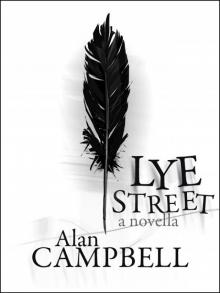 Lye Street
Lye Street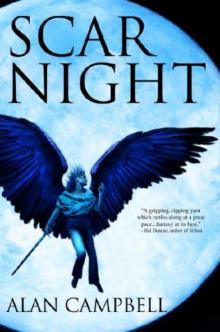 Scar Night; Book One of the Deepgate Codex Trilogy
Scar Night; Book One of the Deepgate Codex Trilogy Art of Hunting
Art of Hunting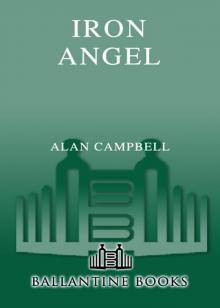 Iron Angel
Iron Angel Gravedigger 01 - Sea Of Ghosts
Gravedigger 01 - Sea Of Ghosts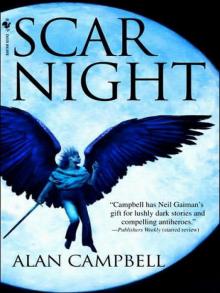 Scar Night
Scar Night The Art of Hunting
The Art of Hunting God of Clocks
God of Clocks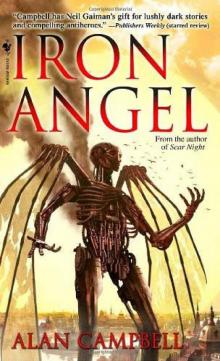 Iron Angel dc-2
Iron Angel dc-2